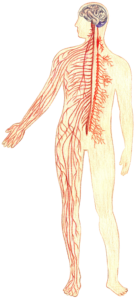5 Stress Management Tools
‘Stress is like spice – in the right proportion it enhances the flavor of a dish. Too little produces a bland, dull meal; too much may choke you.’ –Donald Tubesing
The fact is, stress is part of life. There are times when there is definitely too much, and it’s likely that many of us have made it through some challenging times in the last couple years especially. Changes in work, schooling, and childcare, uncertainty of financial situations, threat of health challenges, and so much of the unknown may be sources of stress for a lot of people.
Thankfully, the body is equipped to handle stress. In fact, there is a whole system in place set up to utilize and manage stressful situations. One of the beautiful and amazing things about it is how wonderfully organized it is. The nervous system is split into two branches: the peripheral nervous system and central nervous system, which can be further split into branches that work together. Below is a small organization flow. Be amazed!
Nervous System
A. Central Nervous System
1. Brain – receives and processes 
2. Spinal Cord – conducts signals to and from brain, reflex activities
B. Peripheral Nervous System – connects the Central Nervous System to limbs and organs
1. Motor Neurons – Central Nervous System to muscles and glands
2. Sensory Neurons – Sensory organs to Central Nervous System
a. Somatic Nervous System – voluntary control of movement
b. Autonomic Nervous System – involuntary responses
i. Sympathetic – “Fight or flight”
ii. Parasympathetic – “Rest and digest”
iii. Enteric Nervous System – mesh-like system of neurons that governs the GI tract. Independent of Sympathetic and Parasympathetic, but also influenced by them.
Anatomy
Maybe you find the organization of the body’s nervous system boring, and that’s okay! Just know that your body is equipped to handle stress and that it’s important that we learn to manage it before it becomes chronic and harmful.
The GI tract has so many nerves running through and around it, it’s got its own Enteric Nervous System. Part of that is because the GI tract is highly vascularized. When blood is needed elsewhere, the nervous system must prompt that blood flow to move to skeletal muscle and move now.
When activated, the sympathetic nervous system produces a series of choreographed hormonal responses that get the body ready to flee from challenges. These responses are healthy and needed but being chronically activated can lead to troubles.
Long-term stress can cause a disruption in homeostasis and inflammation. As you can see in the organization, the GI tract is greatly influenced by both the Sympathetic and Parasympathetic Nervous Systems. When placed under stress, the nervous system can affect food absorption, the transit time of food – either faster or slower – and can even be the cause of muscle spasms.
Thankfully the mind is a powerful tool and it can be used to help manage the body’s response.
The following suggestions can be used as tools, but they do take work. The good news is they get easier with time and practice. Just like we exercise our bodies, it’s important to exercise our minds to promote mental health. Equip yourself (kids too) with these tools! You can use them for years to come.
Tool 1: Reach out. 
Reach out to friends and family. Relationships are an important part of life. Make them a priority! When face to face contact isn’t possible, utilizing technology to connect through Zoom, FaceTime, and other live chat options can be a great way to connect with loved ones!
Tool 2: Practice gratitude.
Who do you appreciate? Teachers and school administrators have always been superstars, but we really see them shining now. Sending a quick message of thanks can be meaningful to both parties.
Do you have a role model who has been a great example in your life? A note of thanks letting them know of the impact they’ve made in your life can mean so much. 
There really are so many things to be thankful for. Simply writing down a list and placing it somewhere visible can be a good reminder of perspective when the going gets tough.
Tool 3: Move your body.
Exercising is a great way to get rid of the jitters. If you are home with kids, it is very likely that they too may be feeling cooped up. Exercise is good for the mind and great support for your gut and immune system, too. Check out our past blog post for more ways to keep your kids healthy!
Tool 4: Try Grounding.
Grounding is a technique that teaches us to be present and to regain mental focus. It can be a great tool for removing our minds from feelings of overwhelm or anxiety. There are many great grounding tools that can be found with a simple google search, but a great introductory tool is called the 5-4-3-2-1 technique.
5 – Look for five things you can see. Take the time to notice the details on each object and put words to what you see.
4 – Become aware of four things you can touch. Acknowledge the sleeve that’s pulled up on your wrist creating a little pressure on your skin. Feel the smooth glass of your water bottle.
3 – Acknowledge three things you can hear. Is your puppy breathing heavily while napping? Take note of the abrupt sounds of the keyboard. 
2 – Notice two things you can smell. Lingering smells from breakfast, sweaty feet from active kids. Don’t judge; just notice.
1 – Become aware of one thing you can taste. Is there a lingering taste of coffee or the long-lasting flavor of mint on your tongue?
Tool 5: Seek Professional Help
Self-management of anxiety and stress can be very effective. However, there are times when seeking help from a licensed professional is the best thing to do in order to discover the root cause. Many virtual options are available currently including betterhelp, talkspace, amwell, and many more.
Ultimately, we can live confidently knowing that we have hope and a future.
You are equipped and able to do hard things!
Written by Lorilyn Van Dyke

 New customers! Get 11% OFF your first Flourish order with Code FRESHSTART11
New customers! Get 11% OFF your first Flourish order with Code FRESHSTART11